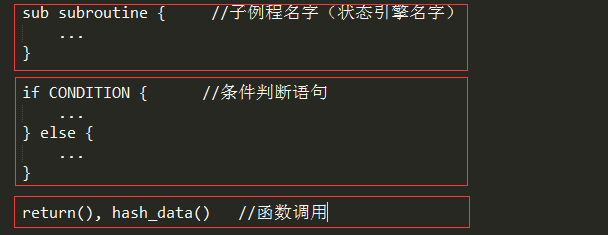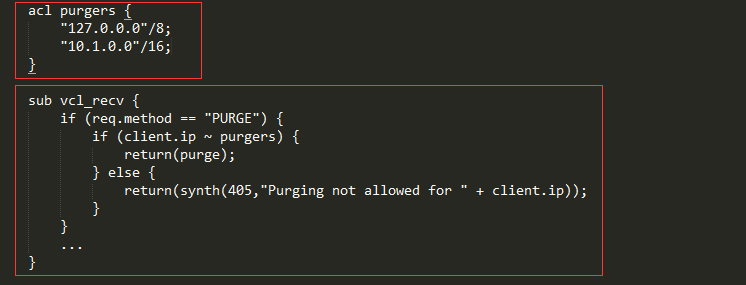首页 > 代码库 > varnish 使用进阶
varnish 使用进阶
varnish 使用进阶
================================================================================
概述:
================================================================================
VCL配置用法详解
1.state engine:状态引擎切换机制(varnish4.0 )
★request:
vcl_recv 接受请求报文
★response:
vcl_deliver 发送请求报文
★处理流程:
①缓存命中
vcl_hash -(hit)-> vcl_hit --> vcl_deliver
②缓存未命中
vcl_hash -(miss)-> vcl_miss --> vcl_backend_fetch --> vcl_backend_response --> vcl_deliver
③缓存修减(处理,清理)
vcl_hash -(purge)-> vcl_purge --> vcl_synth
④请求不能识别,直接响应到后端,建立一个管道
vcl_hash -(pipe)-> vcl_pipe
★两个特殊的引擎:
vcl_init:在处理任何请求之前要执行的vcl代码:主要用于初始化VMODs;
vcl_fini:所有的请求都已经结束,在vcl配置被丢弃时调用;主要用于清理VMODs;
2.vcl的语法格式:
★语法格式
VCL files start with vcl 4.0;
指明版本
//, # and /* foo */ for comments;
单行和多行注释
Subroutines are declared with the sub keyword;
子例程要用sub关键字声明 例如:sub vcl_recv { ...};
No loops, state-limited variables
不支持循环,受限于引擎的内建变量;
Terminating statements with a keyword for next action as argument of the return() function, i.e.: return(action);
Domain-specific;
域专用的配置
★The VCL Finite State Machine vcl 有限状态机
Each request is processed separately;
Each request is independent from others at any given time;
States are related, but isolated;
return(action); exits one state and instructs Varnish to proceed to the next state;
Built-in VCL code is always present and appended below your own VCL;
★三类主要语法:
示例:
[root@centos7 ~]# varnishadm -S /etc/varnish/secret -T :6082
200
-----------------------------
Varnish Cache CLI 1.0
-----------------------------
Linux,3.10.0-327.el7.x86_64,x86_64,-smalloc,-smalloc,-hcritbit
varnish-4.0.3 revision b8c4a34
Type ‘help‘ for command list.
Type ‘quit‘ to close CLI session.
vcl.show -v boot # 查看boot配置文件详细信息
vcl 4.0;
#######################################################################
# Client side
sub vcl_recv {
if (req.method == "PRI") {
/* We do not support SPDY or HTTP/2.0 */
return (synth(405));
}
if (req.method != "GET" &&
req.method != "HEAD" &&
req.method != "PUT" &&
req.method != "POST" &&
req.method != "TRACE" &&
req.method != "OPTIONS" &&
req.method != "DELETE") {
/* Non-RFC2616 or CONNECT which is weird. */
return (pipe);
}
if (req.method != "GET" && req.method != "HEAD") {
/* We only deal with GET and HEAD by default */
return (pass);
}
if (req.http.Authorization || req.http.Cookie) {
/* Not cacheable by default */
return (pass);
}
return (hash);
}
sub vcl_pipe {
# By default Connection: close is set on all piped requests, to stop
# connection reuse from sending future requests directly to the
# (potentially) wrong backend. If you do want this to happen, you can undo
# it here.
# unset bereq.http.connection;
return (pipe);
}
sub vcl_pass {
return (fetch);
}
sub vcl_hash {
hash_data(req.url);
if (req.http.host) {
hash_data(req.http.host);
} else {
hash_data(server.ip);
}
return (lookup);
}
sub vcl_purge {
return (synth(200, "Purged"));
}
sub vcl_hit {
if (obj.ttl >= 0s) {
// A pure unadultered hit, deliver it
return (deliver);
}
if (obj.ttl + obj.grace > 0s) {
// Object is in grace, deliver it
// Automatically triggers a background fetch
return (deliver);
}
// fetch & deliver once we get the result
return (fetch);
}
sub vcl_miss {
return (fetch);
}
sub vcl_deliver {
return (deliver);
}-------------------------------------------------------------------------------
3.VCL Built-in Functions and Keywords 內建函数和关键字
★函数:
regsub(str, regex, sub) 正则表达式替换
regsuball(str, regex, sub) 替换所有
ban(boolean expression) 清理缓存项
hash_data(input) 对指定的数据做哈希计算
synthetic(str)
★Keywords:
call subroutine 调用子例程关键字
return(action) return关键字,指明下一次的action
new
set 设定一个变量值
unset 撤销一个变量值
★操作符:
==, !=, ~, >, >=, <, <=
逻辑操作符:&&, ||, !
变量赋值:=
演示:
通过判断响应报文缓存命中的次数来判断是否命中缓存
1)因为是响应报文,所以在val_deliver中定义,所以编辑/etc/varnish/default.vcl如下:

2)让配置生效需要执行varnish_reload_vcl也可手动执行,如下:
[root@centos7 ~]# varnishadm -S /etc/varnish/secret -T :6082 200 ----------------------------- Varnish Cache CLI 1.0 ----------------------------- Linux,3.10.0-327.el7.x86_64,x86_64,-smalloc,-smalloc,-hcritbit varnish-4.0.3 revision b8c4a34 Type ‘help‘ for command list. Type ‘quit‘ to close CLI session. vcl.load testconf1 default.vcl # 给重载的配置起个名字 200 VCL compiled. vcl.list 200 active 0 boot available 0 testconf1 # 这时为available vcl.use testconf1 # 使用此配置 200 VCL ‘testconf1‘ now active vcl.list 200 available 0 boot active 0 testconf1 # 变为active
3)在浏览器中查看,可以发现在http首部添加的首部X-Cache 为HIT,说明为缓存命中的,如下:
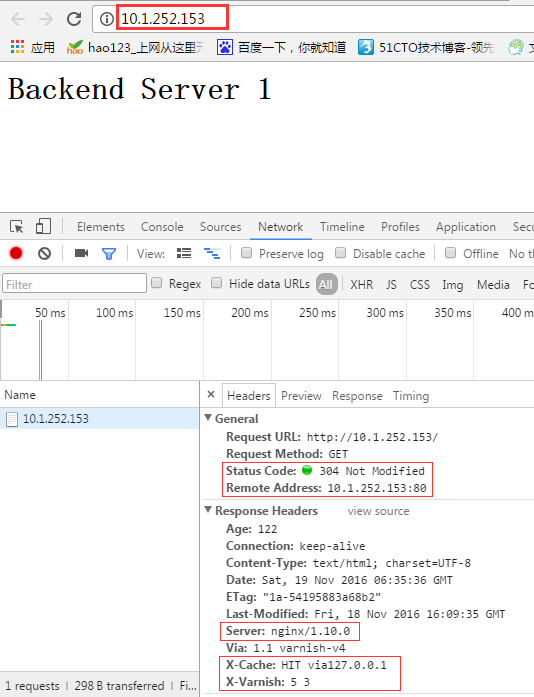
-------------------------------------------------------------------------------
VCL变量详解
1.内建变量和用户自定义变量:
★內建变量
☉req.*:request,表示由客户端发来的请求报文相关;
req.http.*
req.http.User-Agent, req.http.Referer, ...
☉bereq.*:由varnish发往BE主机的httpd请求相关;
bereq.http.*
☉beresp.*:由BE主机响应给varnish的响应报文相关;
beresp.http.*
☉resp.*:由varnish响应给client相关;
☉obj.*:存储在缓存空间中的缓存对象的属性;只读;
★用户自定义变量
set
unset
2.常用内建变量:
☉bereq.*, req.*:
bereq.http.HEADERS
bereq.request: 请求方法;
bereq.url: 请求的url;
bereq.proto: 请求的协议版本;
bereq.backend: 指明要调用的后端主机;
req.http.Cookie: 客户端的请求报文中Cookie首部的值;
req.http.User-Agent ~ "chrome" 浏览器的类型被chrome匹配
☉beresp.*, resp.*:
beresp.http.HEADERS
beresp.status: 响应的状态码;
reresp.proto: 协议版本;
beresp.backend.name: BE主机的主机名;
beresp.ttl: BE主机响应的内容的余下的可缓存时长;
☉obj.*
obj.hits: 此对象从缓存中命中的次数;
obj.ttl: 对象的ttl值
☉server.*
server.ip
server.hostname
☉client.*
client.ip
附图:
变量的使用范围:
演示1:
强制对某类资源的请求不检查缓存,这里以login和admin类为例
-------------------------------------------------------------------------------
1)首先在后端主机创建一个login的目录并提供测试页面,如下:
[root@RS1 ~]# mkdir /var/www/html/login [root@RS1 ~]# echo "<h1>Login Page</h1>" > /var/www/html/login/index.html [root@RS1 ~]# cat /var/www/html/login/index.html <h1>Login Page</h1>
2)此时请求login中的资源,可以看到第一次是后端主机直接响应的,之后都是命中缓存,有varnish直接响应,如下:
[root@CentOS6 ~]# curl -I http://10.1.252.153/login/index.html HTTP/1.1 200 OK Server: nginx/1.10.0 Date: Sat, 19 Nov 2016 07:55:21 GMT Content-Type: text/html; charset=UTF-8 Content-Length: 20 Connection: keep-alive Last-Modified: Sat, 19 Nov 2016 07:47:02 GMT ETag: "14-541a2a0d1380d" X-Varnish: 65538 Age: 0 Via: 1.1 varnish-v4 X-Cache: MISS via127.0.0.1 [root@CentOS6 ~]# curl -I http://10.1.252.153/login/index.html HTTP/1.1 200 OK Server: nginx/1.10.0 Date: Sat, 19 Nov 2016 07:55:28 GMT Content-Type: text/html; charset=UTF-8 Content-Length: 20 Connection: keep-alive Last-Modified: Sat, 19 Nov 2016 07:47:02 GMT ETag: "14-541a2a0d1380d" X-Varnish: 32772 65539 Age: 7 Via: 1.1 varnish-v4 X-Cache: HIT via127.0.0.1
3)现在,我们定义其请求报文,如果含有login和admin的就不从缓存中响应,编辑/etc/varnish/default.vcl,在vcl_recv定义如下:

4)配置生效,执行varnish_reload_vcl或者手动执行,如下:
[root@centos7 ~]# varnishadm -S /etc/varnish/secret -T :6082 200 ----------------------------- Varnish Cache CLI 1.0 ----------------------------- Linux,3.10.0-327.el7.x86_64,x86_64,-smalloc,-smalloc,-hcritbit varnish-4.0.3 revision b8c4a34 Type ‘help‘ for command list. Type ‘quit‘ to close CLI session. vcl.list 200 available 0 boot active 0 testconf1 vcl.load testconf2 default.vcl 200 VCL compiled. vcl.load vcl.list 200 available 0 boot active 0 testconf1 available 0 testconf2 vcl.use testconf2 200 VCL ‘testconf2‘ now active vcl.list 200 available 0 boot available 0 testconf1 active 0 testconf2
5)再次请求发现现在都是从后端主机直接响应的,不在命中缓存,如下:
[root@CentOS6 ~]# curl -I http://10.1.252.153/login/index.html HTTP/1.1 200 OK Server: nginx/1.10.0 Date: Sat, 19 Nov 2016 07:58:11 GMT Content-Type: text/html; charset=UTF-8 Content-Length: 20 Connection: keep-alive Last-Modified: Sat, 19 Nov 2016 07:47:02 GMT ETag: "14-541a2a0d1380d" Accept-Ranges: bytes X-Varnish: 32774 Age: 0 Via: 1.1 varnish-v4 X-Cache: MISS via 127.0.0.1 [root@CentOS6 ~]# curl -I http://10.1.252.153/login/index.html HTTP/1.1 200 OK Server: nginx/1.10.0 Date: Sat, 19 Nov 2016 07:58:12 GMT Content-Type: text/html; charset=UTF-8 Content-Length: 20 Connection: keep-alive Last-Modified: Sat, 19 Nov 2016 07:47:02 GMT ETag: "14-541a2a0d1380d" Accept-Ranges: bytes X-Varnish: 65546 Age: 0 Via: 1.1 varnish-v4 X-Cache: MISS via 127.0.0.1
示例总结:
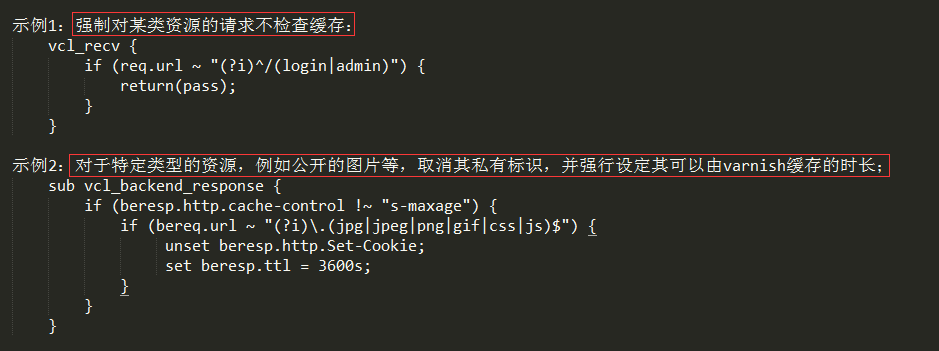
--------------------------------------------------------------------------------
缓存对象的修剪
---purge,ban
★purge:清理单个url所对应的资源;
★ban:清理表达式模式匹配到的所有url缓存所对应的资源;
★能执行purge操作
★何时执行purge操作
★添加此类请求的访问控制法则:
收到用户的请求方法为“purge”然后就执行return purage
------------------------------------------------------------------------------
1)编辑/etc/varnish/default.vcl,在vcl_recv定义如下:
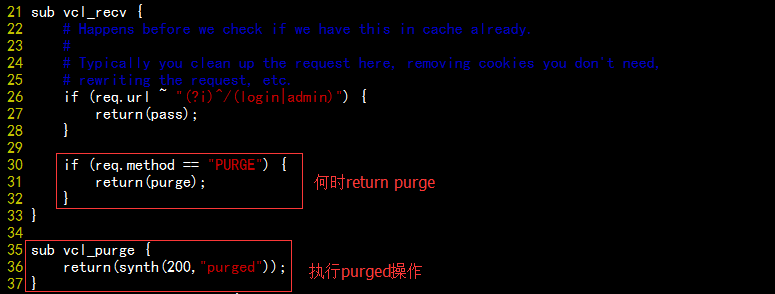
2)配置生效,执行varnish_reload_vcl或者手动执行,如下:
[root@centos7 ~]# varnish_reload_vcl Loading vcl from /etc/varnish/default.vcl Current running config name is boot Using new config name reload_2016-11-19T18:06:32 VCL compiled. VCL ‘reload_2016-11-19T18:06:32‘ now active available 0 boot active 0 reload_2016-11-19T18:06:32 Done
3)使用curl命令请求,如下:
# 第一次请求因为没有缓存所以由后端服务器直接响应,之后在过期时间内一直是缓存响应 [root@CentOS6 ~]# curl -I http://10.1.252.153/index.html HTTP/1.1 200 OK Server: nginx/1.10.0 Date: Sat, 19 Nov 2016 10:12:57 GMT Content-Type: text/html; charset=UTF-8 Content-Length: 26 Connection: keep-alive Last-Modified: Fri, 18 Nov 2016 16:09:35 GMT ETag: "1a-54195883a68b2" X-Varnish: 32790 Age: 0 Via: 1.1 varnish-v4 X-Cache: MISS via 127.0.0.1 # 后端服务器响应 [root@CentOS6 ~]# curl -I http://10.1.252.153/index.html HTTP/1.1 200 OK Server: nginx/1.10.0 Date: Sat, 19 Nov 2016 10:13:00 GMT Content-Type: text/html; charset=UTF-8 Content-Length: 26 Connection: keep-alive Last-Modified: Fri, 18 Nov 2016 16:09:35 GMT ETag: "1a-54195883a68b2" X-Varnish: 32793 32791 Age: 4 Via: 1.1 varnish-v4 X-Cache: HIT via 127.0.0.1 # 之后一直是缓存响应
# 使用自定义PURGE请求 ,会送往return purge,清理指定url缓存。 [root@CentOS6 ~]# curl -X PURGE <!DOCTYPE html> <html> <head> <title>200 purged</title> </head> <body> <h1>Error 200 purged</h1> <p>purged</p> <h3>Guru Meditation:</h3> <p>XID: 20</p> <hr> <p>Varnish cache server</p> </body> </html> [root@CentOS6 ~]# curl -I http://10.1.252.153/index.html HTTP/1.1 200 OK Server: nginx/1.10.0 Date: Sat, 19 Nov 2016 10:13:58 GMT Content-Type: text/html; charset=UTF-8 Content-Length: 26 Connection: keep-alive Last-Modified: Fri, 18 Nov 2016 16:09:35 GMT ETag: "1a-54195883a68b2" X-Varnish: 22 Age: 0 Via: 1.1 varnish-v4 X-Cache: MISS via 127.0.0.1 # 再次请求,发现来自后端服务器响应 [root@CentOS6 ~]# curl -I http://10.1.252.153/index.html HTTP/1.1 200 OK Server: nginx/1.10.0 Date: Sat, 19 Nov 2016 10:13:59 GMT Content-Type: text/html; charset=UTF-8 Content-Length: 26 Connection: keep-alive Last-Modified: Fri, 18 Nov 2016 16:09:35 GMT ETag: "1a-54195883a68b2" X-Varnish: 32795 23 Age: 1 Via: 1.1 varnish-v4 X-Cache: HIT via 127.0.0.1 # 之后都是缓存响应
4)现在,对能够执行return purge 做acl访问控制,只允许来自本机的网络执行,编辑配置文件如下:
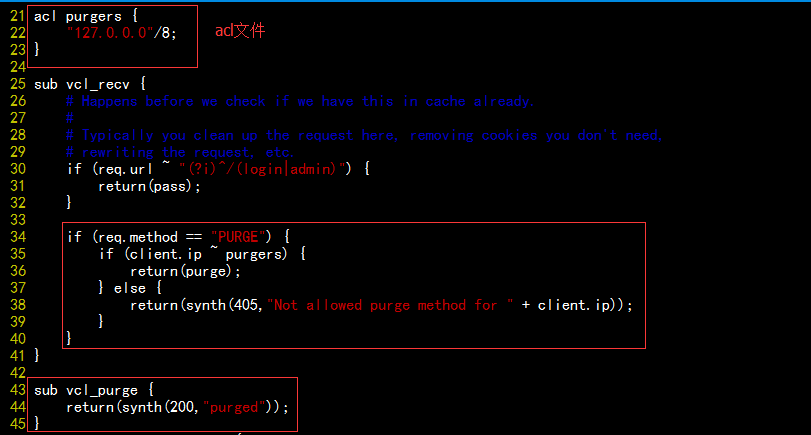
配置生效,执行varnish_reload_vcl或者手动执行,如下:
[root@centos7 ~]# varnish_reload_vcl Loading vcl from /etc/varnish/default.vcl Current running config name is reload_2016-11-19T18:06:32 Using new config name reload_2016-11-19T18:33:15 VCL compiled. VCL ‘reload_2016-11-19T18:33:15‘ now active available 0 boot available 0 reload_2016-11-19T18:06:32 active 0 reload_2016-11-19T18:33:15 Done
测试,我这里不使用nginx反代,因为nginx和varnish在同一台主机,所以,用户请求nginx的80服务,是由nignx反代至varnish,而varnish识别的使nginx反代的地址,不是用户的地址,所以这里为了演示效果,不使用nginx反代。然后在远程主机请求,如下:
[root@CentOS6 ~]# curl -X PURGE http://10.1.252.153:6081/index.html <!DOCTYPE html> <html> <head> <title>405 Not allowed purge method for 10.1.252.205</title> # 不允许请求 </head> <body> <h1>Error 405 Not allowed purge method for 10.1.252.205</h1> <p>Not allowed purge method for 10.1.252.205</p> <h3>Guru Meditation:</h3> <p>XID: 32806</p> <hr> <p>Varnish cache server</p> </body> </html>
# 在本地请求可以正常响应,如下: [root@centos7 ~]# curl -X PURGE http://127.0.0.1:6081/index.html <!DOCTYPE html> <html> <head> <title>200 purged</title> </head> <body> <h1>Error 200 purged</h1> <p>purged</p> <h3>Guru Meditation:</h3> <p>XID: 33</p> <hr> <p>Varnish cache server</p> </body> </html>
varnish 使用进阶

